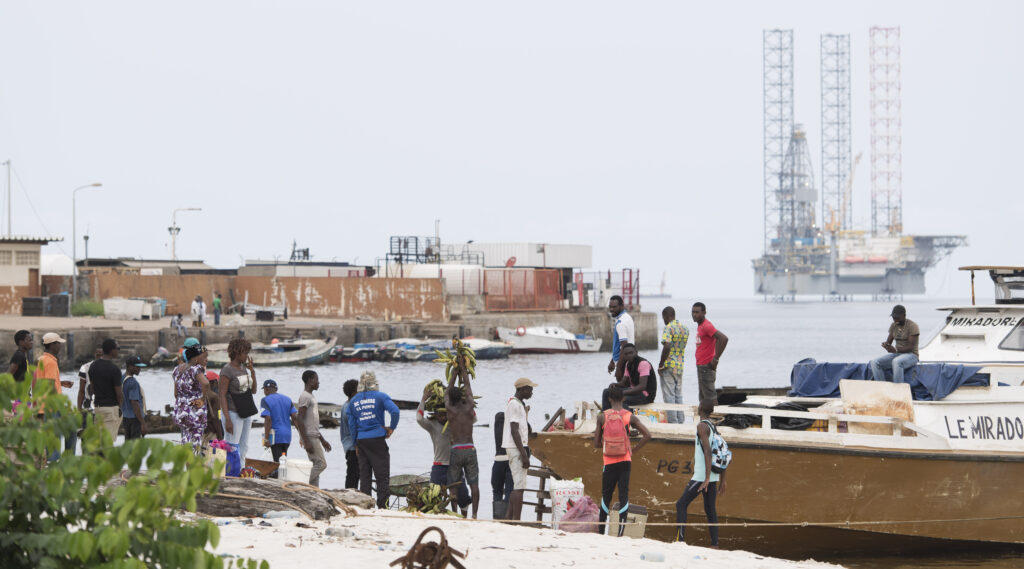After decades of suffering what a government minister called “financial evaporation”, oil-rich Gabon badly needs to revamp crucial infrastructure and diversify its economy but is heavily indebted.The small central African country holds presidential elections on Saturday, after 19 months under military leadership following a coup that ended more than five decades of Bongo dynasty rule. While the general who led the coup, Brice Oligui Nguema, is now running for the top job, recognition that economic change is needed is evident at government level.Buzz phrases such as “eliminate waste”, “moving away from a windfall economy” and “paradigm change” abound within Gabon’s ministries.”Today we have no choice but to make other choices,” Economy Minister Mark Alexandre Doumba said recently.After 55 years of iron-fisted rule by the Bongos, who were accused of looting its wealth, Gabon was prey to “financial evaporation”, Budget Minister Charles Mba said.”From 2010 to 2023, we had an investment budget of 18,000 billion CFA francs ($29 billion) and we did nothing because we don’t see any roads, hospitals, schools, universities,” he said on state television.While the lack of infrastructure is glaring, the administration is also inefficient and bloated — Gabon has a motorway department but no motorway.Despite successive plans, only 2,000 of the 10,000 kilometres (6,213 miles) of roads in the country are “usable”, according to official data.Derailments are frequent on the sole rail link, the Trans-Gabon Railway, which runs from east to west linking mining regions with the capital Libreville and the mineral port of Owendo.The state of the around 700 km of track has severely deteriorated in the half century or so since it was laid through equatorial forest.The only electricity network, operated by public enterprise SEEG, regularly suffers breakdowns, which are a source of public discontent.”No structural investment has been made in the past 20 years,” while energy consumption needs virtually doubled between 2010 and 2024, according to SEEG interim administrator Steve Saurel Legnongo.UN resident coordinator in Libreville Savina Ammassari warned that change would take time.”Matters have gradually deteriorated and today there is a major effort to turn a page… although things cannot be changed overnight,” she said.- Spiralling debt -Major projects financed under strongman Oligui’s leadership are only advancing by means of a deliberate policy of increased debt and sometimes struggle to come to fruition.”The lack of follow-up on development policies has cost us much efficiency,” Alexandre Barro Chambrier, deputy prime minister for planning, said last month.There was a time when things seemed straightforward.”We had everything we needed to succeed: oil, manganese, uranium… We thought we didn’t have to do anything since everything fell from the sky,” Industry Minister Lubin Ntoutoume said.While the oil industry, the country’s chief economic pillar, has generated billions in annual profits since the first wells were drilled in the 1950s, debt has continued to spiral.Two years ago, it was 72.1 percent of gross domestic product, rising to 73.3 percent last year and is projected to reach 80 percent this year.At the same time, the country anticipates a depletion of its oil resources.Gabonese production has halved over the past 30 years, falling from 500,000 barrels of oil per day at its peak in 1996, to 250,000 barrels per day by this year, according to the International Monetary Fund. Falling oil prices this week and the barrage of US tariffs are not going to help.The decline is due to depleting mature oilfields and the absence of the discovery of major new reserves. Over that same timeframe, the population has more than doubled, from 1.1 to 2.3 million.But in 50 years, the average income per capita has fallen by half and more than a third of the population lives below the poverty line, according to the World Bank.Youth unemployment hovers around 40 percent, rising to more than 60 percent in rural areas, official data shows.Seeking a seven-year presidential term, Oligui promises “growth towards happiness” as he campaigns around the country.”An oil-producing country doesn’t starve… Don’t be afraid! Don’t believe those who tell you the country is in a bad way,” he said in the western town of Donguila, pledging to convince private bankers and international lenders to support his plans to build up the nation.Financial analysts advocate public spending cuts, reassessing the tax base and valuing the carbon credits of a country that ranks as one of the planet’s green lungs thanks to a policy of environmental protection.Gabon “acts as a champion of carbon neutrality initiatives”, the World Bank said in a report.
